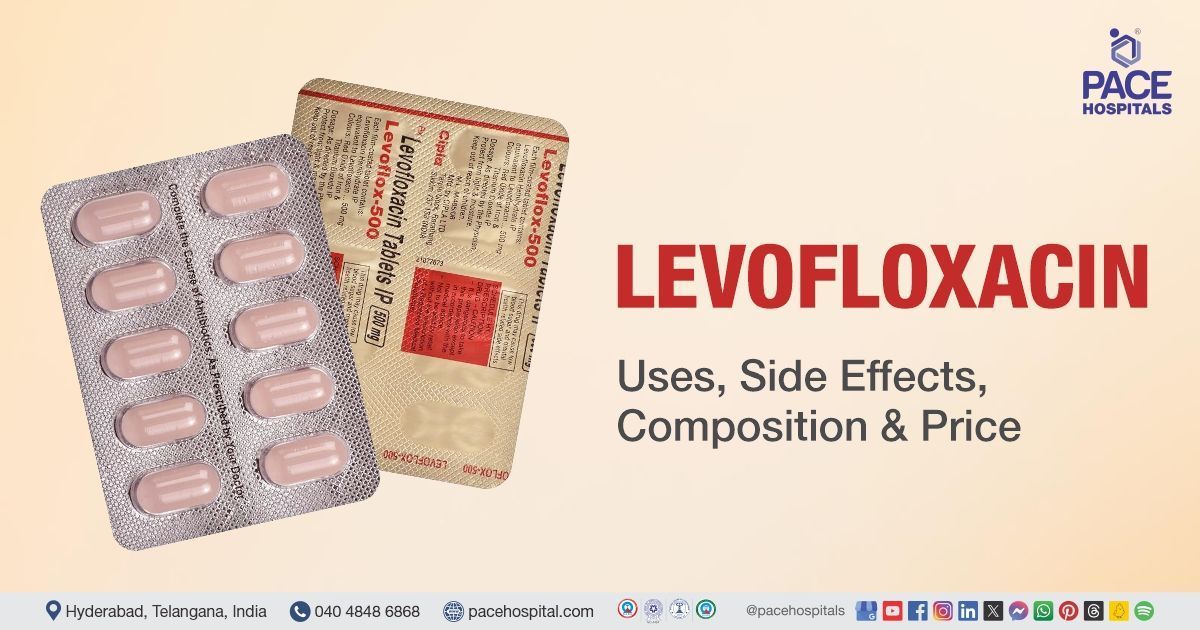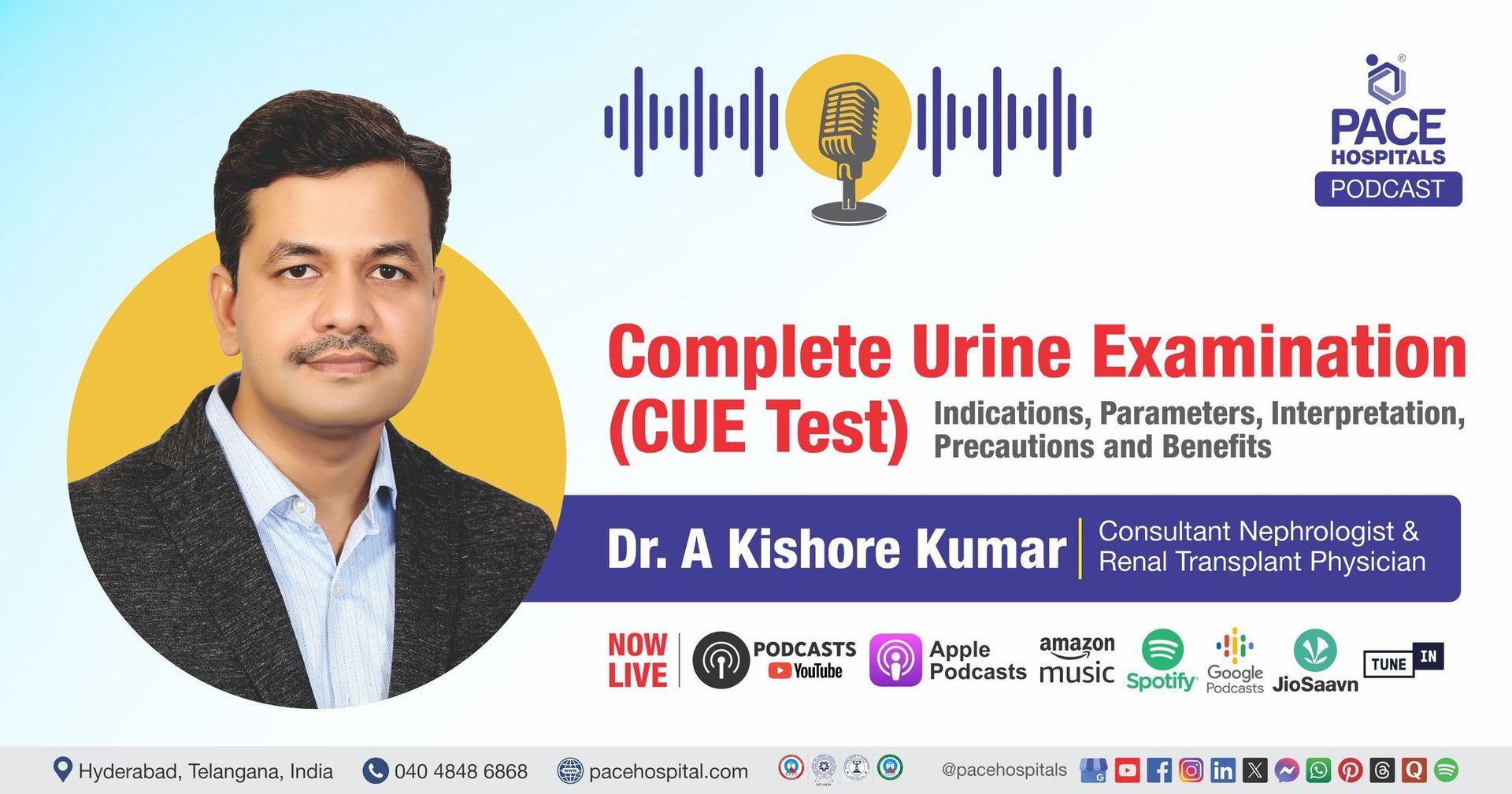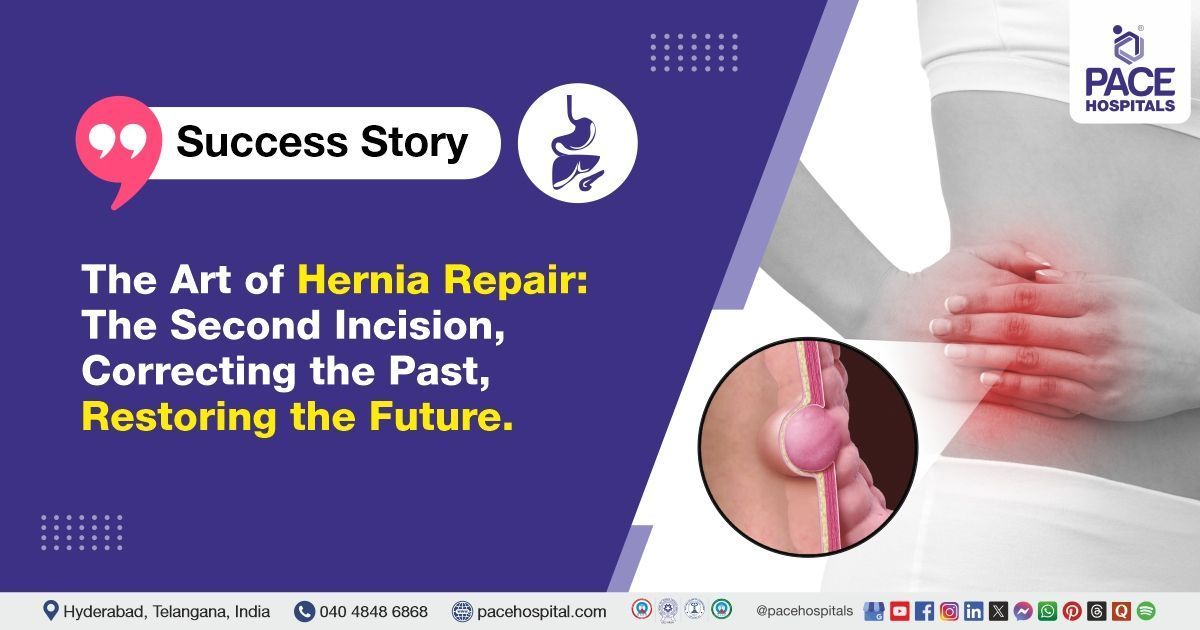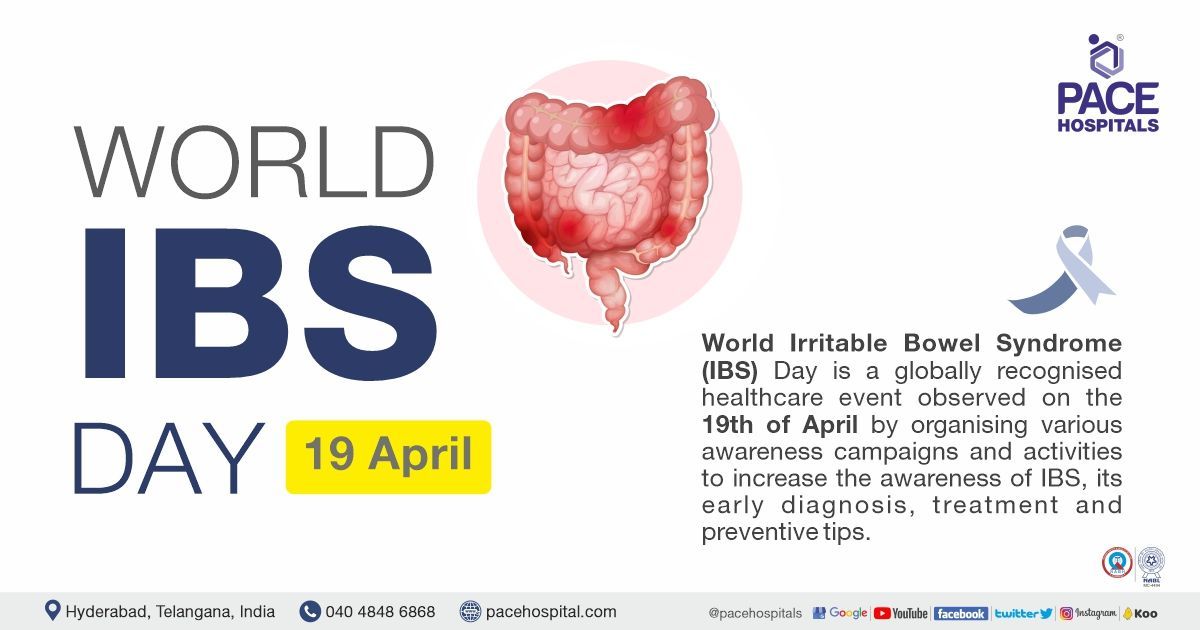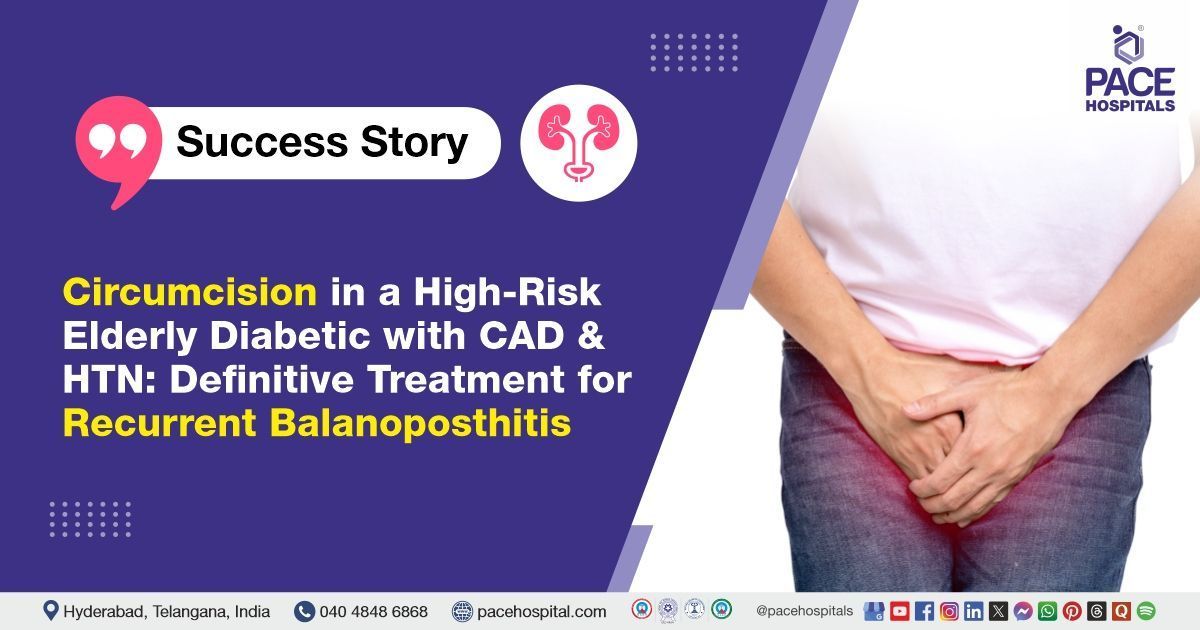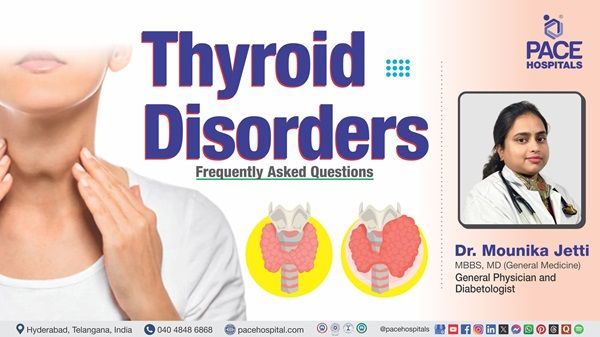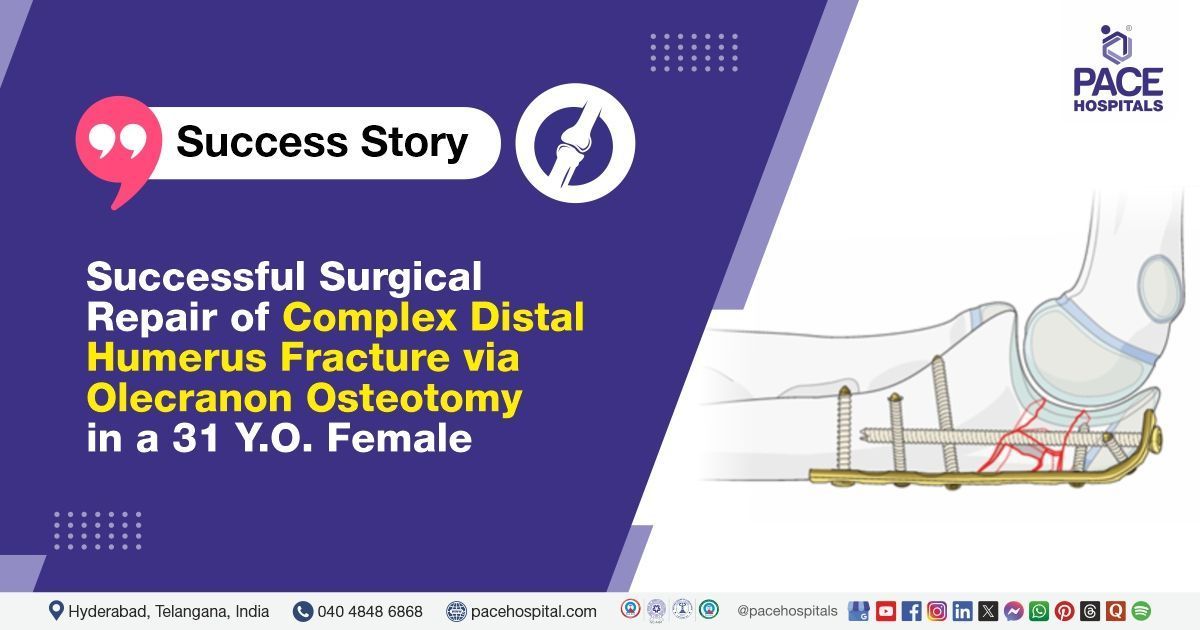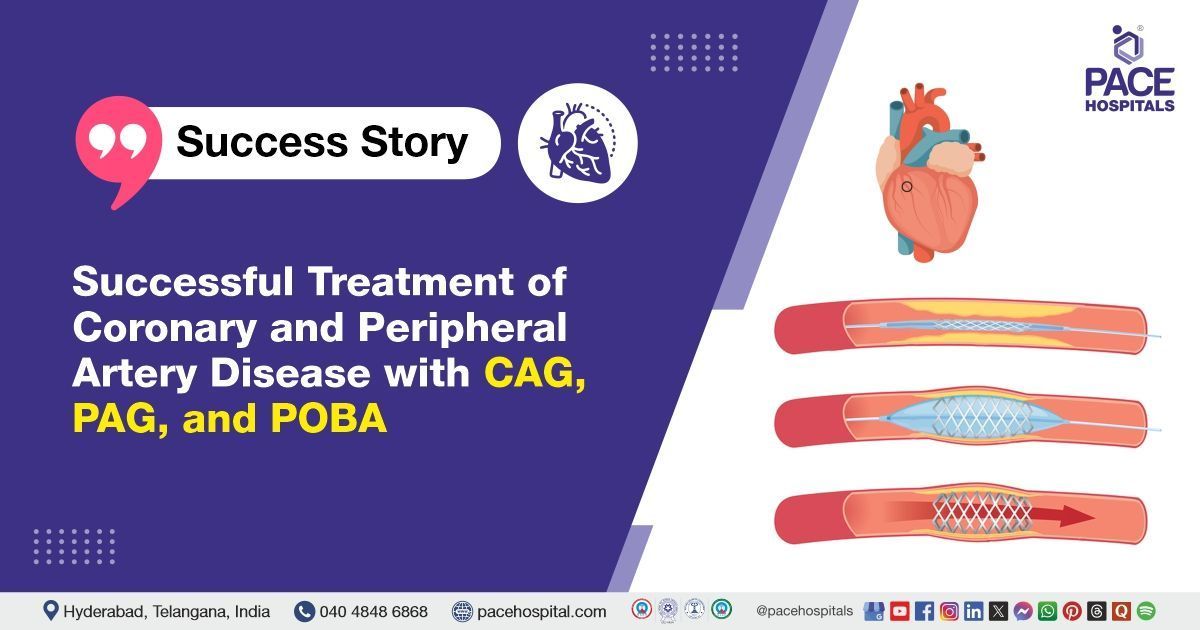Levoflox 500 Tablet - Uses, Side Effects, Composition, Dosage & Price
Manufactured by - Cipla Limited
Levoflox 500 Composition - Each Levoflox Tablet 500 MG, 10’S (10 tablets per strip) contains Levofloxacin Hemihydrate IP - equivalent to Levofloxacin 500mg
Overview
Levoflox 500mg tablet (Levofloxacin), is an antibiotic that belongs to a class of third-generation fluoroquinolones. This drug is used to treat a variety of bacterial infections, most importantly bronchitis (Inflammation of lung passages), acute pneumonia (Lung infection), skin infections, and urinary tract infections etc. where the bacteria pose severe risk of infection and make a person sick by faster replication.
- Levofloxacin is available in oral and intravenous formulations. It is a broad-spectrum antibiotic of fluoroquinolone drug class, active against a wide range of gram-positive and gram-negative bacteria and atypical microorganisms.
- Levofloxacin is proven to be effective clinically and bacteriologically by treating infections caused by penicillin-susceptible and penicillin-resistant variants of S. Pneumoniae. This drug is usually well tolerated in patients, but with some of the phototoxic or hepatic adverse effects observed in a few patients when concomitantly administered with other quinolone class of drugs.
- The drug also has a pharmacokinetic profile compatibility with once-a-day administration and allows for sequential intravenous to oral therapy. Recent approvals in the US for its use in the treatment of nosocomial pneumonia and chronic bacterial prostatitis and the introduction of a short-course, high-dose regimen for use in community-acquired pneumonia (CAP) further extended the role of levofloxacin in treating the bacterial infections.
- This antibiotic was patented in 1987 and received FDA approval in the year 1996 for medical use.
Levoflox Price
Maximum retail price as per year 2024:
- Levoflox 500 price - ₹100.68 for one strip (10 tablets in each strip).
- Levoflox 750 price - ₹69.72 for one strip (5 tablets in each strip).
- Levoflox 250 price - ₹53.98 for one strip (10 tablets in each strip).
Levoflox tablet is available at mostly each and every pharmacy.
Levoflox tablet uses
Levofloxacin (Levoflox 250, 500 & 750 mg) is a broad-spectrum antibiotic which belongs to a class of third-generation fluoroquinolone, used to treat bacterial infections. Misuse or unnecessary use of levofloxacin can impact the drug efficacy. Levofloxacin uses include:
- Nosocomial pneumonia(hospital-acquired pneumonia)
- Community-acquired pneumonia (acute infection of the pulmonary parenchyma )
- Skin and soft tissue infections (SSTI) being both complicated and uncomplicated
- Chronic bacterial prostatitis (swelling of the prostate gland)
- Acute bacterial exacerbation of chronic bronchitis (immediate worsening of symptoms of COPD including shortness of breath (SOB), quantity and colour of phlegm that typically lasts for several days)
- Acute bacterial sinusitis (bacterial infection in the sinuses and nasal cavity that can occur after a viral infection or other cause of inflammation)
- Inhalational anthrax, post-exposure in levofloxacin dosage for adults and pediatric patients
- Plague in adult and pediatric patients
- Urinary tract infections (UTI)
- Acute pyelonephritis (kidney inflammation)
- Bacterial conjunctivitis (ophthalmic formulation)
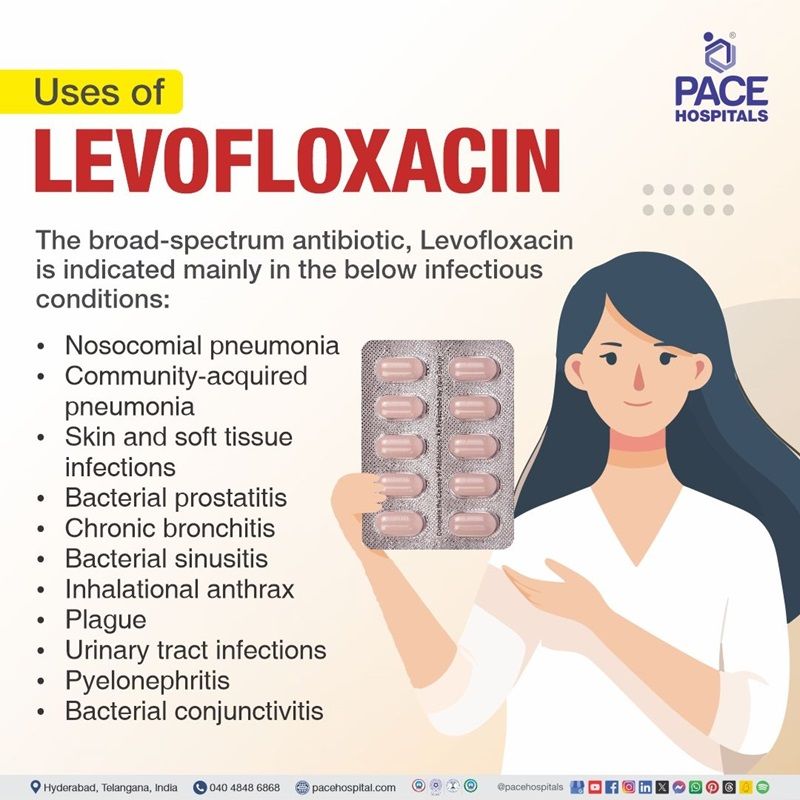
Guidelines to follow while taking the Levofloxacin (Levoflox 250, 500 & 750) tablet
Levofloxacin 500 mg is recommended to be taken as prescribed by the physician, within the prescribed strength of the drug formulations
- Levofloxacin is unavailable for administration through intramuscular (IM), intrathecal, or subcutaneous (SQ) routes.
- In general, the available oral dosage strengths are levofloxacin 250mg, levofloxacin 500mg, and levofloxacin 750mg. Oral dosing must be taken with/without meals. However, the oral solution should be taken 1 hour before or 2 hours after meals.
- It is not recommended to use antacids and levofloxacin concomitantly. In such case, a time gap of two hours should be maintained between antacids with Mg+ or Al+ salts and levofloxacin. To prevent crystalluria, the patient must be hydrated sufficiently.
Levofloxacin Mechanism of action
- Levofloxacin is a bactericidal antibiotic belonging to the fluoroquinolone drug class that directly inhibits bacterial DNA synthesis. This drug helps to break DNA strands by inhibiting DNA-gyrase in susceptible organisms by inhibiting the supercoiled DNA relaxation.
- A growing concern about drug resistance to fluoroquinolones exists worldwide, which can occur through chromosome-encoded or plasmid-mediated mechanisms.
Levofloxacin (Levoflox 250, 500 & 750) Side Effects
It is recommended to avoid prescribing levofloxacin to older patients and patient with a history of Marfan or Ehlers-Danlos syndrome.
Common side effects of Levofloxacin (Levoflox 500)
The most common side effects of levofloxacin 500 side effects include:
- Headache
- Nausea (vomiting sensation)
- Diarrhea (loose, watery stools)
- Insomnia (sleeping disorder)
- Constipation (hard-to-pass stools)
- Dizziness
Serious side effects of Levofloxacin
Though very rare, some severe side effects of levofloxacin could be caused by medication non-compliance. Some of the severe side effects of levofloxacin tablets are given below.
- Peripheral neuropathy (Changes in sensation and possible nerve damage)
- Liver damage (Hepatotoxicity)
- Aortic aneurysm and dissection (aortic increases the risk of a tear in the aortic lining, known as a dissection)
- Intestinal infection (Pseudomembranous colitis)
- Sensitivity to sunlight (photosensitivity)
NOTE: if any of the above symptoms are seen, immediately contact the concerned doctor or a physician.
Side Effects of Levofloxacin on Specific Organs
- Renal impairment: The standard dose of levofloxacin is usually reduced to half in case of renally impaired patients.
- Hepatic impairment: The dose adjustment is generally not required for levofloxacin in case of hepatic impaired patients, as this drug is eliminated primarily by the kidneys and undergoes negligible hepatic metabolism. This antibiotic can be used in patients with cirrhosis to prevent spontaneous bacterial peritonitis (SBP) and in patients allergic to cephalosporins.
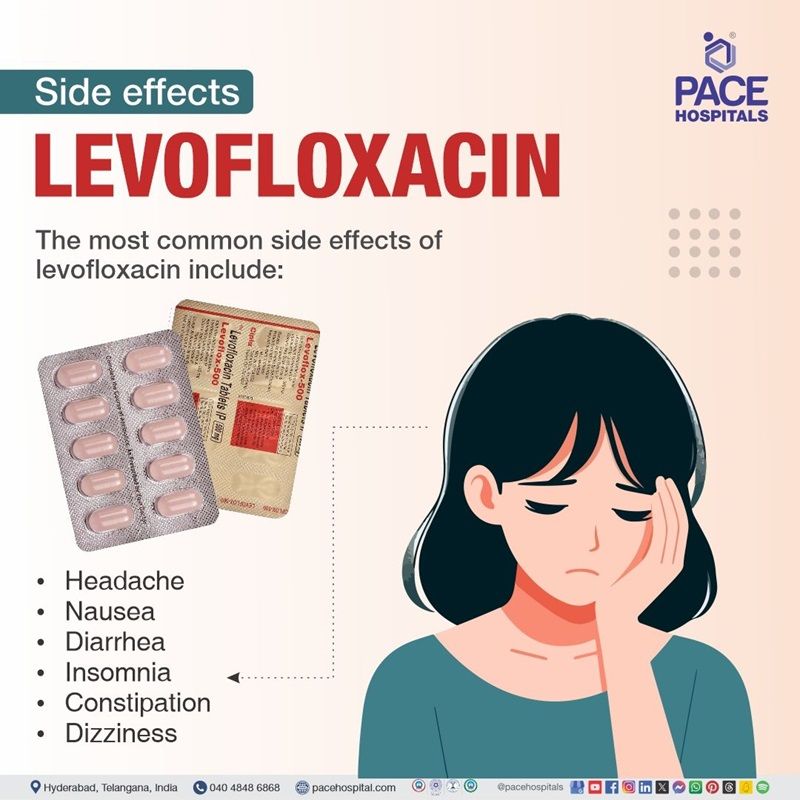
Levofloxacin (Levoflox 250, 500 & 750) Dosage
Levofloxacin tablet dosage is prescribed by the general physician based on the patient's age, weight, and disease symptoms.
Levofloxacin dosage for Adults
- The recommended oral dose regimen of levofloxacin would be 750 mg (once a day) to treat nosocomial pneumonia and skin structure infections for a period of 1–2 weeks.
- Daily dosing of levofloxacin 500 mg (once a day) is recommended to treat acute bacterial exacerbation of chronic bronchitis and acute bacterial sinusitis.
- The daily dosing of levofloxacin 250 mg (once a day) is recommended for patients with complicated urinary tract infections, acute pyelonephritis, or uncomplicated urinary tract infections.
Levofloxacin Paediatric dose
- Levofloxacin is used to treat children aged six months or older who may have breathed in anthrax germs, have plague, or been exposed to plague germs.
- Vomiting sensation or nausea is commonly seen in children of six months and older age under levofloxacin medication to treat anthrax disease or plague.
Levofloxacin in Geriatrics
- Geriatric patients on corticosteroid therapy who take levofloxacin are at a higher risk of experiencing severe tendon disorders, including rupture, several months after the fluoroquinolone treatment. If any symptoms occur, prompt discontinuation of the drug is necessary.
- Discontinuation of levofloxacin is recommended in elderly population with potential QT interval cardiac output.
Levofloxacin in Pregnancy
- Acute and recurrent urinary tract infections (UTI) in pregnant women recommend using agents other than levofloxacin, such as amoxicillin-clavulanic acid or cefuroxime.
- In patients with multi-drug-resistant tuberculosis, levofloxacin can be considered even if the patient is pregnant, in case if the benefits of treatment to the mother outweigh the harm.
Levofloxacin in Breastfeeding infants
- Levofloxacin has not been used in infants because of consideration of adverse consequences on the infants’ developing joints. Levofloxacin may cause problems with bones, joints, and tissues around joints in children.
- Breast milk has a low concentration of levofloxacin, which is unlikely to cause damaging effects in breastfeeding babies. Using levofloxacin in breastfeeding mothers is acceptable with monitoring the infant for possible gastrointestinal (GI) tract adverse effects (diarrhea or candidiasis).
Levofloxacin drug interactions with foods, drugs and diseases
A drug interaction is a reaction between two or more drugs, whereas it is called a food interaction if the interaction is between the food and the drug. In case of an interaction between a disease and a drug, it is called a disease-drug interaction.
Drug interactions
- When levofloxacin is concomitantly administered with oral hypoglycaemic agents like Glimepiride, there is an increased risk of decreased blood sugar levels in the patient.
- Levofloxacin along with non-steroidal anti-inflammatory drugs (NSAIDs) such as diclofenac can cause seizures.
- When levofloxacin and thioridazine are administered together, there is a risk of QTc prolongation and reduces the absorption of levofloxacin.
Food interactions
- It is recommended to avoid milk and other dairy products and alcohol.
- Vitamin supplements that contain magnesium, aluminium, calcium, iron, and other minerals may interfere with the absorption of levofloxacin.
Disease interactions
- A person with colitis, neurological disorders, myasthenia gravis, peripheral neuropathy, tendonitis, and crystalluria conditions should use the medication under the supervision of a doctor only.
Levofloxacin Storage
Levofloxacin should be stored in a safe place away from the light and moisture, in a cool and dry place. It is important to keep it out of children's reach.
Frequently Asked Questions (FAQs) on Levofloxacin (Levoflox 250, 500 & 750) Tablet
What is Levofloxacin used for?
Levofloxacin is a medication used to treat and prevent conditions such as cystitis, pyelonephritis, nongonococcal urethritis, skin and skin structure infections, and pneumonia. It can also be used to treat conditions like Bronchitis, Plague, and Inhalation Anthrax.
What kind of bacteria does levofloxacin treat?
Levofloxacin is an antibacterial agent. It belongs to a broad-spectrum antibiotic fluoroquinolone drug class that is active against a range of gram-negative bacteria and gram-positive and atypical organisms. It is active against both penicillin-susceptible and penicillin-resistant Streptococcus pneumonia.
Is levofloxacin safe?
Levofloxacin is a broad-spectrum antibiotic, which is safe and effective medicine from third-generation fluoroquinolone class, used to treat bacterial infections. It is used with care as prescribed by the physician in the recommended dose and duration.
Can a person consume alcohol with levofloxacin?
Patients should avoid drinking alcohol while taking levofloxacin, as alcohol may interrupt the expected therapeutic outcome of the drug, and alcohol is known to show its side effects, like drowsiness or dizziness.
Can levofloxacin be used for throat infection?
Levofloxacin tablets are prescribed to treat various types of bacterial infections affecting the throat, lungs, sinuses, kidneys, urinary tract, skin, and soft tissues. It is effective against a wide range of bacterial strains and is commonly used to combat these infections.
Can levofloxacin cause liver damage?
Yes, very rarely, levofloxacin can cause liver injury. However, the exact mechanism of action of fluoroquinolones, being hepatotoxic, is still unknown. Some of the majorly seen symptoms of levofloxacin-induced liver injury are
jaundice, abdominal discomfort, and fatigue.
Can levofloxacin treat typhoid?
Though ciprofloxacin is the standard drug of choice to treat
typhoid fever, there is an increasing trend of salmonella typhi being resistant to ciprofloxacin. In such cases, it is proven that levofloxacin is more effective than ciprofloxacin in terms of better bioavailability and selective permeability.
Can Levofloxacin be taken with milk?
No, It is better to avoid milk and other dairy products a few hours before and after consuming the antibiotic. The calcium in milk binds with the drug and prevents its complete absorption.
Can you take ibuprofen with levofloxacin?
It is generally not recommended to take levofloxacin with other non-steroidal anti-inflammatory drugs like ibuprofen as the ibuprofen can cause central nervous system stimulation and possibly seizure very rarely.
Does levofloxacin contain sulfa?
No, the levofloxacin belongs to fluoroquinolone class of drug class and don’t contain sulfa group in active or inactive form.
Can you take levofloxacin and amoxicillin together?
Yes, The concomitant administration of levofloxacin and amoxicillin is recommended by doctors, especially in situations of complicated diseases like community-acquired pneumoniae (CAP), urinary tract infections etc.
Does levofloxacin treat bronchitis?
Levofloxacin, a class of antibiotics called fluoroquinolones, may also treat bronchitis. Antibiotics such as levofloxacin work by killing bacteria infection. However, it is important to remember that using antibiotics when they are not needed increases the risk of getting an infection later that resists antibiotic treatment.
How long does levofloxacin take to work?
One should feel better within one to two hours of taking levofloxacin. Nonetheless, it may take up to three days before symptoms of the disease begin to resolve.
Is Levofloxacin a broad-spectrum antibiotic?
Levofloxacin is a broad-spectrum antibiotic fluoroquinolone drug class that is active against a range of gram-negative bacteria, gram-positive and atypical organisms. It has been proven to be effective clinically and bacteriologically in treating infections caused by penicillin-susceptible and penicillin-resistant variants of S. Pneumoniae.
Share on
Request an appointment
Fill in the appointment form or call us instantly to book a confirmed appointment with our super specialist at 04048486868

